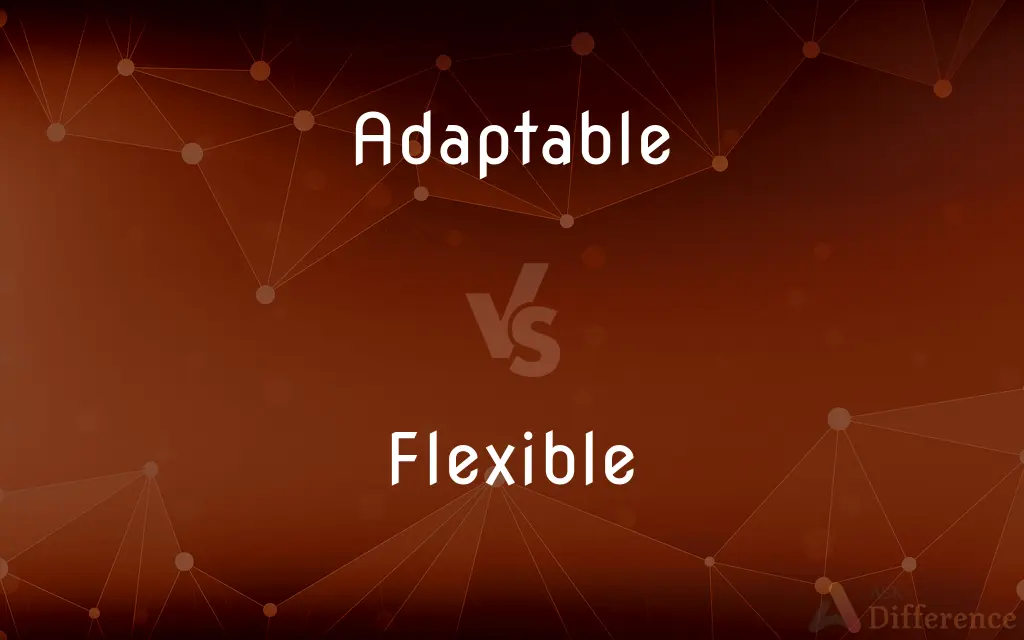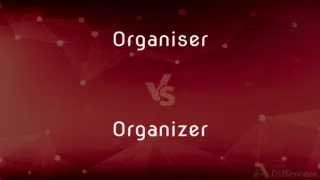Adaptable vs. Flexible — What's the Difference?
Edited by Tayyaba Rehman — By Urooj Arif — Updated on March 26, 2024
Adaptable individuals easily adjust to new conditions, focusing on long-term changes, while flexible people swiftly adapt to immediate changes, emphasizing versatility.

Difference Between Adaptable and Flexible
Table of Contents
ADVERTISEMENT
Key Differences
Adaptable individuals thrive by adjusting to new environments or situations over time, indicating a capacity for enduring change. This trait often requires learning new skills or altering long-term strategies. Whereas, flexibility denotes an immediate capacity to adjust to changes without significant preparation or alteration in underlying strategies. It's more about short-term adjustments.
Adaptability is seen as a broader trait that encompasses the ability to evolve with changing circumstances, including altering one's behavior or thoughts to suit new conditions. This could involve significant life changes or career shifts. On the other hand, being flexible often relates to more immediate and practical adjustments, like changing plans for a day or adapting a project to meet a new deadline.
Those who are adaptable are often praised for their resilience and ability to face long-term challenges with a strategic approach. They are prepared to learn and grow in response to life's shifts. Conversely, flexible individuals excel in situations requiring quick decisions and immediate action, showcasing their ability to think on their feet without needing a profound change in direction or thought.
In the workplace, adaptability might mean learning new technologies or methodologies that fundamentally change how work is done, requiring a willingness to embrace significant change and possibly a steep learning curve. Flexibility, however, might involve adjusting to a new work schedule or handling multiple tasks simultaneously without a need for deep learning or personal growth.
Adaptability and flexibility both play crucial roles in personal and professional development. Being adaptable allows individuals to navigate through life's significant changes with grace, while flexibility enables them to manage day-to-day variations effectively. Each trait is valuable in its own right, offering a complementary approach to dealing with changes and challenges.
ADVERTISEMENT
Comparison Chart
Focus
Long-term adjustments
Short-term adjustments
Required Change
Deep, often involving personal growth
Superficial, without deep changes
Situations
Significant life or career changes
Immediate, practical situations
Learning & Growth
Requires learning new skills
Minimal learning, quick adjustments
Benefits
Resilience, enduring change
Quick thinking, immediate action
Compare with Definitions
Adaptable
Able to adjust to new conditions.
She was quickly adaptable to the new country's culture.
Flexible
Ready to change or compromise.
Our plan is flexible, allowing for last-minute changes.
Adaptable
Willing to change or compromise.
An adaptable business strategy proved crucial for survival.
Flexible
Able to be easily modified.
The flexible software accommodates various needs.
Adaptable
Capable of being modified for a new use.
The software is adaptable for different users.
Flexible
Willing to change or try different things.
A flexible attitude is key to problem-solving.
Adaptable
Able to learn new skills.
He is adaptable, mastering new technologies effortlessly.
Flexible
Adaptable to new situations.
Flexible workers adjust quickly to schedule changes.
Adaptable
Flexible and open to change.
Adaptable employees are essential for a growing company.
Flexible
Capable of bending easily without breaking.
Yoga makes your body more flexible.
Adaptable
Capable of being adapted.
Flexible
Capable of bending easily without breaking
Flexible rubber seals
Adaptable
Capable of adapting or of being adapted.
Flexible
Capable of being bent or flexed; pliable
A flexible hose.
Adaptable
Capable of adapting or of being adapted.
Flexible
Readily bending or twisting the body without injury
You can play soccer much better if you're flexible.
Adaptable
Capable of adapting (of becoming or being made suitable) to a particular situation or use;
To succeed one must be adaptable
The frame was adaptable to cloth bolts of different widths
Flexible
Able to change to cope with variable circumstances
"a flexible and quietly competent administrator" (Jerome Karabel).
Flexible
Capable of being changed or adjusted to meet particular or varied needs
A job with flexible hours.
A flexible definition of normality.
Flexible
Capable of being flexed or bent without breaking; able to be turned or twisted without breaking.
Flexible
Willing or prone to give way to the influence of others; not invincibly rigid or obstinate.
Flexible
Capable or being adapted or molded in some way.
A flexible language
Flexible
Something that is flexible.
Flexible
Capable of being flexed or bent; admitting of being turned, bowed, or twisted, without breaking; pliable; yielding to pressure; not stiff or brittle.
When the splitting windMakes flexible the knees of knotted oaks.
Flexible
Willing or ready to yield to the influence of others; not invincibly rigid or obstinate; tractable; manageable; ductile; easy and compliant; wavering.
Phocion was a man of great severity, and no ways flexible to the will of the people.
Women are soft, mild, pitiful, and flexible.
Flexible
Capable or being adapted or molded; plastic,; as, a flexible language.
This was a principle more flexible to their purpose.
Flexible
Extended meanings; capable of change;
A flexible character
Flexible schedules
Flexible
Able to flex; able to bend easily;
Slim flexible birches
Flexible
Able to adjust readily to different conditions;
An adaptable person
A flexible personality
An elastic clause in a contract
Flexible
Bending and snapping back readily without breaking
Flexible
Making or willing to make concessions;
Loneliness tore through him...whenever he thought of...even the compromising Louis du Tillet
Common Curiosities
How is flexibility different from adaptability?
Flexibility refers to the ability to quickly adjust to immediate, short-term changes without needing significant personal growth, whereas adaptability involves deeper, long-term adjustments.
Can a person be adaptable but not flexible?
Yes, a person can be adaptable, capable of significant long-term changes, but struggle with making quick, short-term adjustments.
Why is adaptability important?
Adaptability is important because it allows individuals to endure and thrive through significant changes in life or career, fostering resilience.
How can I become more adaptable?
To become more adaptable, focus on learning new skills, being open to change, and willing to step out of your comfort zone.
How does adaptability impact career growth?
Adaptability can significantly impact career growth by enabling individuals to embrace and thrive in new roles, technologies, or methodologies.
Are adaptable people also flexible?
Adaptable people often have elements of flexibility, but the two traits focus on different scales of change – long-term versus short-term.
Can flexibility help in personal life?
Yes, flexibility can greatly assist in personal life by allowing individuals to manage day-to-day variations and unexpected situations effectively.
What does it mean to be adaptable?
Being adaptable means you can adjust to new conditions and environments, often involving personal growth or learning new skills.
How does one measure adaptability?
Adaptability can be measured by an individual’s ability to learn new skills, embrace change, and successfully navigate through significant life or career transitions.
What challenges do adaptable individuals face?
Adaptable individuals may face challenges such as the discomfort of constant change, the need for continuous learning, and sometimes the stress of uncertainty.
Is being flexible always an advantage?
Being flexible is generally advantageous as it enables quick adjustments to changing circumstances, though it may not always address deeper or long-term challenges.
What role does flexibility play in team dynamics?
Flexibility plays a critical role in team dynamics by enabling members to adjust roles, workflows, and strategies quickly to meet project demands or changes.
Why is flexibility valued in the workplace?
Flexibility is valued in the workplace because it allows employees to adjust quickly to changes in schedules, project demands, and workflows, enhancing overall efficiency.
Can organizations be adaptable and flexible?
Yes, organizations can and should strive to be both adaptable and flexible to survive and thrive in a rapidly changing business environment.
How can I improve my flexibility?
Improving flexibility involves practicing openness to change, developing quick problem-solving skills, and being willing to adjust plans on short notice.
Share Your Discovery

Previous Comparison
Organiser vs. Organizer
Next Comparison
Lactone vs. LactamAuthor Spotlight
Written by
Urooj ArifUrooj is a skilled content writer at Ask Difference, known for her exceptional ability to simplify complex topics into engaging and informative content. With a passion for research and a flair for clear, concise writing, she consistently delivers articles that resonate with our diverse audience.
Edited by
Tayyaba RehmanTayyaba Rehman is a distinguished writer, currently serving as a primary contributor to askdifference.com. As a researcher in semantics and etymology, Tayyaba's passion for the complexity of languages and their distinctions has found a perfect home on the platform. Tayyaba delves into the intricacies of language, distinguishing between commonly confused words and phrases, thereby providing clarity for readers worldwide.















































